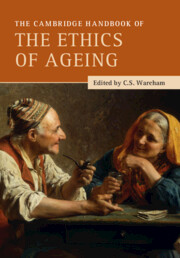Book contents
- The Cambridge Handbook of the Ethics of Ageing
- Cambridge Handbooks in Philosophy
- The Cambridge Handbook of the Ethics of Ageing
- Copyright page
- Contents
- Contributors
- Acknowledgements
- Introduction
- Part I Ageing and the Good Life
- 1 Old Age and the Preference for the Future
- 2 Ageing and the Temporality of the Good Life
- 3 Children’s Prudential Value
- 4 The Ethics of Ageing in Frank Perry’s The Swimmer
- 5 Is Ageing Good?
- 6 Mental Health in Old Age
- 7 In Defense of a Semi-Stoical Attitude about Ageing and Death
- Part II Ageing and Morality
- Part III Ageing and Society
- References
- Index
1 - Old Age and the Preference for the Future
from Part I - Ageing and the Good Life
Published online by Cambridge University Press: 23 August 2022
- The Cambridge Handbook of the Ethics of Ageing
- Cambridge Handbooks in Philosophy
- The Cambridge Handbook of the Ethics of Ageing
- Copyright page
- Contents
- Contributors
- Acknowledgements
- Introduction
- Part I Ageing and the Good Life
- 1 Old Age and the Preference for the Future
- 2 Ageing and the Temporality of the Good Life
- 3 Children’s Prudential Value
- 4 The Ethics of Ageing in Frank Perry’s The Swimmer
- 5 Is Ageing Good?
- 6 Mental Health in Old Age
- 7 In Defense of a Semi-Stoical Attitude about Ageing and Death
- Part II Ageing and Morality
- Part III Ageing and Society
- References
- Index
Summary
As one becomes older, an increasing proportion of one’s life is in the past. Yet, as Derek Parfit has noted, we have a 'bias towards the future' in that we care more about our future life than we do about our past. Yet our past life does matter to us in various ways. Although, as we become older, our past pleasures provide little solace for our ever-diminishing future prospects, other aspects of our past life may well provide not only consolation but compensation. This seems particularly true of our past accomplishments. We might, for example, rationally prefer to have greater achievements in our past even at the cost of having less pleasure in the future. If true, this could have implications for how we ought to live, particularly in early adulthood and middle age.
- Type
- Chapter
- Information
- The Cambridge Handbook of the Ethics of Ageing , pp. 9 - 22Publisher: Cambridge University PressPrint publication year: 2022
- 2
- Cited by

